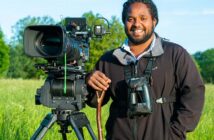Join nature historian Sir David Attenborough on a journey around the globe in a brand-new series co-produced by The Open University (OU) and BBC, Planet Earth III.
Beginning on 22 October at 6.15pm BBC One and iPlayer, this eight-part series follows some of the world’s most amazing species, telling extraordinary stories that are dramatic, thrilling, funny and sometimes heart-breaking, but always full of hope.
OU academics Dr Miranda Dyson and Dr Vicky Taylor were closely involved in the development of the series, providing expert insight and advice on the biology, ecology and behaviour of animals shown in the series.
Dr Miranda Dyson, Senior Lecturer in Behavioural Ecology, commented:
“It’s been almost 20 years since the first Planet Earth series aired on the BBC. Now Sir David is back, once again taking us on a journey to explore the remarkable planet we, and millions of other species, call home.
“From the vast deserts to dense forests, over great oceans to distant coastlines, we are transported into the complex lives of the animals that inhabit these varied and sometimes extreme habitats.
“But in 20 years, much has changed on our planet and a stark reality is, that if we continue to ignore the frightening rate at which the Earth’s biodiversity is declining, filming the behaviour of wild animals in diverse and stunning environments will be a thing of the past.
“Planet Earth III doesn’t shy away from this message and throughout the series addresses the sometimes devastating impacts we are having on habitats, ecosystems and the animals that are struggling to survive in them.”
Dr Vicky Taylor, Senior Lecturer in Biology, said:
“As an academic advisor on the series, I was seriously impressed witnessing so many novel examples revealing the endless ingenuity used by life forms to exploit conditions in our changing world.
“Each of the episodes include remarkable up close (often remotely obtained) sequences of less well-known or charismatic species, documenting their individual struggles and unique fascinating responses for survival.
“But much more is revealed about the strong connections or interdependencies, between different species or species and their habitats.
“Planet Earth III exposes the uncomfortable truth that the current rate of change affecting so many natural habitats is hard for all of their inhabitants to keep up with, but it also documents the ordinary people that go to extraordinary lengths to protect them for the benefit of us all.”
Dr Dyson added:
“As an academic advisor on the series, I was encouraged that the series addresses many of the environmental crises we now face and behind the stories, there is a strong conservation message.
“I hope that the series goes some way in increasing public awareness of conservation issues and encourages human behavioural changes – an essential part of successfully slowing the current environmental crisis.”
Planet Earth III was filmed over the course of nearly five years, making use of pioneering film-making technology to reveal the greatest wonders of life on earth. Lightweight drones, high-speed cameras and remotely operated deep-sea submersibles transport viewers to spectacular unseen landscapes, from the most remote jungles to the deepest oceans, and from the darkest caves to the hottest deserts.
Sir David Attenborough commented on the series:
“In this new series of Planet Earth we travel to the most astonishing wild places, see mysterious creatures, witness rare, spectacular wonders, and reveal breath-taking animal dramas. The natural world continues to surprise us, but since Darwin’s time it has changed beyond recognition, being transformed by a powerful force – us.
“We will see how animals are adapting in extraordinary ways, to survive the new challenges they face. At this crucial time in our history, we must now look at the world through a new lens.”
To celebrate the launch of the series, a new AR experience has been released and will be live from the first episode on Sunday, allowing viewers to experience the journey around the world from their own living room.
Supporting Online Content:
Visit our Broadcast & Partnerships site OU Connect where you can find extensive resources and information on topics related to this programme. We invite you to explore fascinating facts about amazing animals and their remarkable habitats in an AR experience ‘Habitat Explorer’ where you can look at the habitats of the Red-Eyed tree frog, Green Sea Turtle and Apollo Butterfly at your fingertips.
Also, from Sunday, you can order the poster ‘Our Changing World’ and find out how these ever-changing habitats are affecting the animals that live in them, and you can even have a go at making your own origami animals.
Further information
This programme was commissioned by Broadcast and Partnerships and is supported by the Faculty of Science, Technology, Engineering and Maths, with particular relevance to Q52 BSc (Honours) Environmental Science, Q64 BSc (Honours) Natural Sciences, R58 BSc (Honours) Biology, U116 Environment: journeys through a changing world, S295 The biology of survival and SDT306 Environment: Responding to Change
- Commissioned by Dr Caroline Ogilvie, Head of Broadcast & Partnerships
- Academic Consultants: Dr Miranda Dyson and Dr Vicky Taylor
- Media Fellow: Prof. Andrew Norton
- Broadcast Project Manager: Joanna Weeks
- Supporting online content: Andrew Hudson


